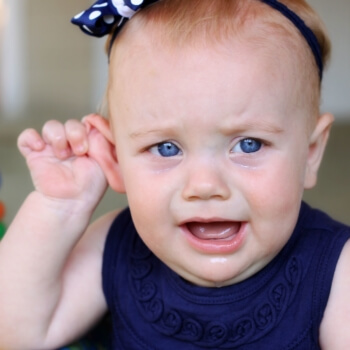Ear infections are common childhood ailments, but can be serious enough to lead to hearing loss. The diseases of the middle ear, known as otitis media, result from bacterial or viral causes, and are often obvious to parents because the child becomes irritable, may spike a fever, and may complain of ear pain; they may tell you verbally or by pulling on their ear.
There are three main types of otitis media:
- Acute otitis media (AOM), this type is usually associated with ear pain, fever, redness, and also fluid in the ear.
- Otitis media with effusion (OME), a symptomless condition that results in a buildup of noninfectious fluid in the middle ear for more than three months.
- Chronic superlative otitis media (CSOM), often a symptom of AOM, is characterized by a discharge from the ear.
In a single year, 11% of the population worldwide suffers from AOM, with more than half the cases present in children less than five, especially male children. Before the age of 10, 80% of children experience AOM.
What Causes Otitis Media?
All forms of otitis media result from bacterial and viral upper respiratory infections (URIs), or allergies, which leads to malfunction of the Eustachian tube. The gas volume usually present in the middle ear is trapped and absorbed by surrounding tissues. As a result, there is negative pressure, which causes fluids from the tympanic cavity to invade the middle ear. As the fluid builds up, the ear becomes infected with secretions from the nasopharynx.
Children, especially boys and siblings in families where ear infections are common, most frequently acquire AOM and other infections in the winter. They are prone to frequent infections because they have short Eustachian tubes that invite viruses and bacteria and large adenoids, which block them. However, other factors leading to the development of infections include exposure to secondhand cigarette smoke, attending childcare, pacifier use, and bottle-feeding.
Symptoms Of AOM
As the fluid in the middle ear presses on the eardrum, the result is pain that is made worse during activities such as chewing, sucking, and lying down. Depending on their age, children may cry or complain.
If left untreated, AOM can lead to hearing loss, delayed speech development, learning disabilities, attention disorders and even problems with depression and social adaptation. Once an infection has taken hold, the effects can be irreversible.
Treating AOM
When your child is fussy and either complains or cries and pulls on their ear, you should take them to the doctor to rule out ear infections. Many infections clear up on their own, especially viral ones. While doctors are hesitant to overuse antibiotics, even for bacterial infections, a course of antibiotics can heal current infections and prevent future ones. Out of fear of prescribing antibiotics too often, however, doctors may adopt a wait-and-see approach, unless the child has a history of infections. In this case, and with viral infections, giving your child acetaminophen or ibuprofen can help reduce pain and fever.
Children with repeated AOM infections, defined as four infections a year or three infections in six months, may be candidates for the installation of tympanostomy tubes. These tubes are inserted into the eardrum to keep the middle ear drained and prevent fluid accumulation. Also called T-tubes, grommets, ear tubes, or pressure equalization tubes, the tubes are inserted while the child is under anesthetic. In time, the tubes usually fall out of the ear. While the tubes are in place, topical eardrops are used rather than oral antibiotics to prevent complications of tube otorrhea or drainage.
Raintree Primary Care And Chiropractic Center Can Help
Whether your child complains of any earache or shows signs that they’re not well, a call to Raintree Medical and Chiropractic Center can rule out acute otitis media and other ear infections. Your primary care provider is your child’s best advocate for preventing long-term hearing problems. To have your child seen, schedule an appointment online, or call us today at 816-623-3020.

